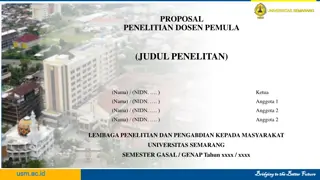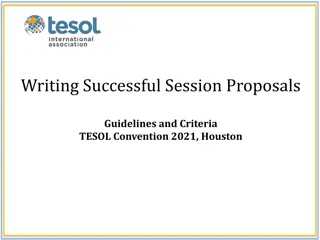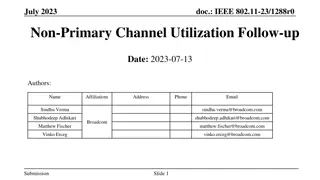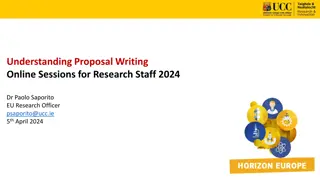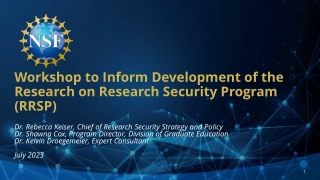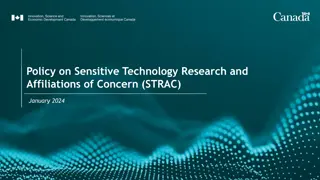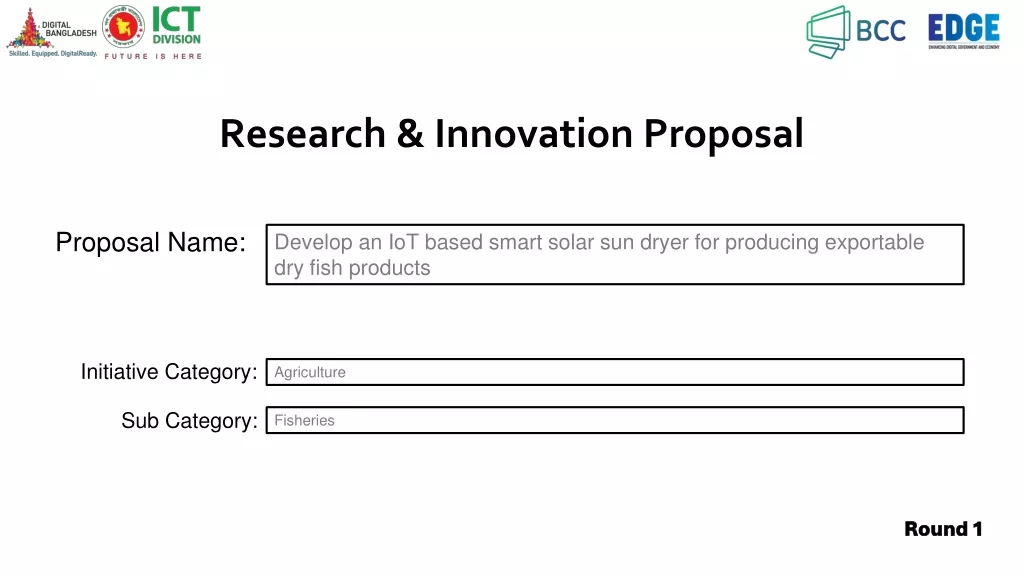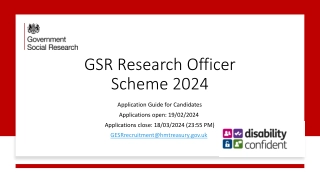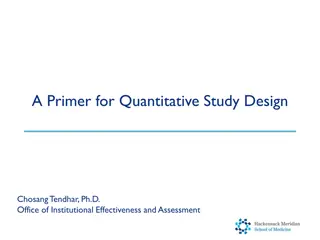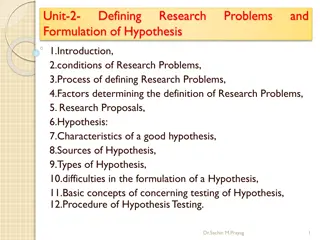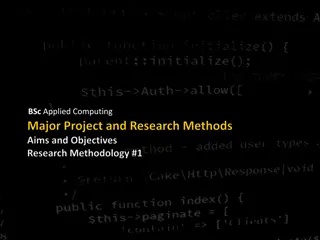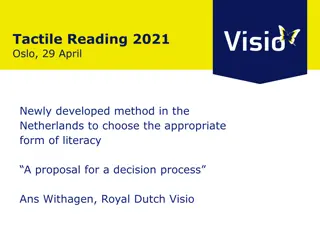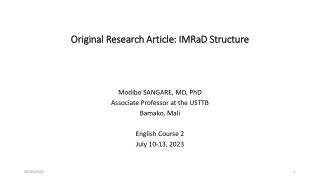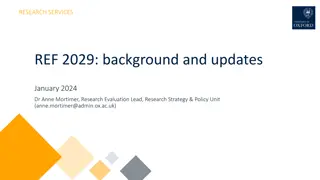Our Research Proposal
Our research proposal aims to identify barriers to active student participation in online courses, focusing on aspects such as lack of personal interaction, technical issues, and unclear expectations. By conducting a survey with students from USF, we seek to uncover insights that can help educators improve online learning experiences and increase student engagement.
Our Research Proposal
PowerPoint presentation about 'Our Research Proposal'. This presentation describes the topic on Our research proposal aims to identify barriers to active student participation in online courses, focusing on aspects such as lack of personal interaction, technical issues, and unclear expectations. By conducting a survey with students from USF, we seek to uncover insights that can help educators improve online learning experiences and increase student engagement.. Download this presentation absolutely free.
Presentation Transcript
Our Research Proposal By: Jake Branco, Emily Quesada, Mihir Khadri, Brandon Guido, Rachel Bryan
Our Research Question Which specific aspects of online learning act as barriers, discouraging active student participation in online courses? Our goal with this research question is to improve online education as a whole by increasing student engagement.
Before starting our research, we put together 3 potential reasons as to why students might not engage as much in online classes: Our Question Continued 1:Lack of Personal Interaction: We believe the absence of face-to-face interaction can make some students feel disconnected. 2:Technical Issues: Problems such as unreliable internet connections, software glitches, and difficulties accessing course materials can frustrate students and deter them from participating in coursework. 3:Unclear Expectations: If the course structure is not well defined, students may feel overwhelmed or unsure about participation guidelines. This can be exasperated in online settings where immediate clarifications might not be possible.
We feel this question deserves funding because we believe everyone deserves a fair education, whether it s face-to-face, or online. Our question is relatable to today s society, especially after the COVID-19 pandemic, where the presence of online courses are prominent. This research could prove valuable, as instructors all through academia are still learning how to navigate their online courses. Providing research on what factors may discourage online student participation could ultimately educate instructors alike on some of the best practices to use in their online teachings! Why Does This Deserve Funding?
Our Data and Methods We chose to go about our research by using a survey. Our data was collected from students at USF that have taken an online class in the past semester. We believe a survey is the best method for this research because gathering responses from these students would yield the most reliable and precise data. They can provide first-hand insights into their online classroom experiences. The objectives of the survey are to: a. Uncover specific aspects of online learning perceived as barriers by students. b. Examine the impact of these identified barriers on student participation in online courses. c. Provide reliable insights to educators and institutions for mitigating these barriers and enhancing online learning experiences.
Our Research Questions 1. Think back to an online class you may have taken. How was your relationship with your professor? (This question can set the tone for whether or not the professor or the student was behind the lack of participation in the course.) 2. How often did you experience technical issues throughout your online class? (This question can gauge how big of an impact technical issues has on the student and their participation.) 3. What did you like the most about your online class, and what did you like the least? Be specific. (This will give us an idea of what techniques engage students) 4. What aspects of online courses do you find most challenging? (This can help identify the cause of disengagement amongst students.)
Our Research Questions 1. How many times throughout said online course did you visit your professor during office hours via in-person or virtual meetings? (This question will confirm or deny the likely case that discouraged students don't visit their professors during office hours.) 2. Has your perspective of online classes changed after taking them yourself? Was this potential change of perspective positive or negative? Explain. (This outlines what students were looking for in an online class v. what they actually got.) 3. How satisfied are you with instructor feedback? (This can show us how often instructors should reach out.) 4. What is one change you would make to online classes based on your experiences? (Gives a potential solution and allows them to give more in-depth answers to previous questions.)
Practical Outcome and Conclusion This research proposal outlines a comprehensive plan to delve into the specific aspects of online learning that act as barriers to active student participation. The study aims to contribute valuable insights into the ongoing enhancement of online education practices, facilitating a more engaging and productive learning environment for students enrolled in online courses. The change that this project will make is finding out how to improve online education across all facets. Online education is a staple for many students, especially after the COVID-19 pandemic, so using research and data to improve it will impact education and how we use it forever. We see our project adding immense value to the practice of communication by giving educators the data needed to enhance communication with their students in online classes. Communication as we know it is constantly changing, with electronic messaging being a primary form of communication. Finding ways to perfect using any strategy we can is very important to the study of communication moving forward.
Werang, B. R., & Radja Leba, S. (2022). Factors Affecting Student Engagement in Online Teaching and Learning: A Qualitative Case Study. The Qualitative Report, 27(2), 555-577. https://doi.org/10.46743/ 2160-3715/2022.5165 L Carlsson, AK Olsson, K Eriksson. (2023). Navigating organizational communication challenges: A case study analysis. Journal of Organizational Communication, 20(3), 234-256. Vonderwell, Selma, and Sajit Zachariah. Factors that influence participation in online learning. Journal of Research on Technology in Education, vol. 38, no. 2, 2005, pp. 213 230, https://doi.org/10.1080/15391523.2005.10782457. Sources https://www.oecd.org/coronavirus/policy-responses/strengthening-online-learning- when-schools-are-closed-the-role-of-families-and-teachers-in-supporting-students- during-the-covid-19-crisis-c4ecba6c/. https://www.oecd.org/. (2020, September 24). https://www.oecd.org/coronavirus/policy-responses/strengthening-online-learning- when-schools-are-closed-the-role-of-families-and-teachers-in-supporting-students- during-the-covid-19-crisis-c4ecba6c/ Ni, Anna Ya. Comparing the Effectiveness of Classroom and Online Learning: Teaching Research Methods. Journal of Public Affairs Education, vol. 19, no. 2, 2013, pp. 199 215. JSTOR, http://www.jstor.org/stable/23608947. Accessed 9 Oct. 2023.


